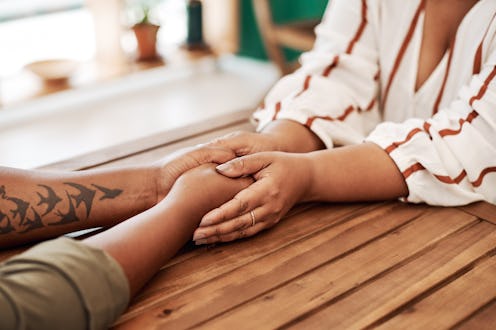Life
Fighting For Anti-Racist Change Is Emotional. Experts Explain How To Manage Burnout.

Global demonstrations against the police killings of Black men, women, and transgender people have started to see gains. Cities like Minneapolis have committed to disbanding their police forces, and monuments commemorating racists have been removed across the globe. But, as anti-racist activists know, the work is far from over. Whether you're protesting, calling your representatives, challenging racism on Instagram, or making other kinds of change, you need to manage emotional burnout.
"I love the quote that 'you can't pour from an empty cup'. While working toward anti-racist justice, you have to remember to 'fill your cup' to avoid burnout," Dr. Rebecca Kuhns, M.D., a psychiatrist, tells Bustle.
Fighting for social justice, particularly if you're newly engaged in activism at the current scale, can have real consequences for mental health. "Scrolling through social media timelines and witnessing disturbing videos and reading encounters of violence and racism could cause secondary traumatic stress (STS)," Elaisha Jade, a certified mindfulness and meditation teacher, tells Bustle. STS, according to a study published in Traumatology in 2018, can involve symptoms like lower mood, disassociation, and intrusive thoughts that make people re-experience the event they saw. Trauma has been linked to mental health issues, fatigue, cardiovascular and neurological disorders, and problems sleeping.
"It's essential we know that and we seek to heal so that our bodies do not carry the unhealed trauma in ways that negatively affect our overall health," Bahiyyah Maroon Ph.D., a social scientist specializing in health and wellbeing in the Black community, tells Bustle.
This exhaustion is not new, particularly for Black people and non-Black people of color who have been fighting against racist systems since the inception of the country. However, anyone involved in the fight to end racism can and should be prioritizing their mental health.
"The first step is to ensure that you are under the care of a mental health professional," Jade says. "There are some incredible free or low-cost resources specifically for protesters." Dr. Kuhns also recommends taking time out for yourself. "Introverts may need time alone to 'unplug' and read a book, while extroverts may crave time with friends and family, just laughing and not talking about justice-related matters," she says. "Knowing what fills your own cup is important — and if you don't know what works for you, now is a great time to experiment with some different forms of self-care."
Self-care is not a lapse in activism; it's part of it. "Remind yourself that you are not a failure for needing personal time or needing to take a step back," she says. "Your impact is still felt." Set aside time to recognize your own feelings. "In a way, anti-racist work means intentionally choosing to experience degrees of trauma on behalf of a greater good," Maroon says.
Maroon notes that it can be helpful to learn about self-healing. "Educate yourself about how to heal trauma, how to identify burnout symptoms, and how to heal long term," she says. Burnout can show up in multiple ways, from low mood and numbness to fatigue and feelings of failure. Treating burnout involves strategies like time-outs, stress-busting exercises, and learning how to distance yourself from your activism so it doesn't always feel personal.
It can also be helpful to think about your intentions. "Meditate on your why, who you are as a person, your ability to identify, and cope with your feelings," licensed professional counselor Alyse Bone tells Bustle. "This will allow remarks, statements, and gestures to be less powerful. Remember: know your why (I am here to practice peaceful protesting to make change on our country), who you are (I am a kind and loving person that is worthy), and your ability to cope (I can take deep breaths and exit the vicinity when I experience a powerful emotion)."
Self-care is not a lapse in activism; it's part of it.
Taking time off social media can also be helpful. "While social media allows us to engage with like-minded people and find support, it can also make us aware of all the racist forces that exist in the world," Dr. Kuhns says. She suggest monitoring the effect that social media engagement has on your mental health, and setting limits on how much time and energy you spend engaging each day. "Calling county, state, or federal officials to demand justice may be a more strategic expenditure of energy than arguing for the third hour with your partner's Uncle Bob who doesn't think racism exists."
Determine your capabilities day by day. "Check in with where you are physically and mentally before taking part in a protest and honor that space," Jade says. Sometimes all your energy will only allow you to sign a few petitions or email a representative, and that's OK too. "Ask yourself if this is the best way to support the cause, especially if you have encountered traumatic experiences in relation to protesting, racism, or negative experiences in large crowds," Bone says.
Jade also suggests meditations at the end of every day. "Cord cutting meditations focus on cutting deep emotional cords tied between yourself and someone or something who may have hurt you," she says. Meditations like this involve visualizing literally cutting yourself loose from sources of stress. They might help you let go of the trauma of the day, and try to renew yourself for the next. And check on those around you; if you and protesting friends look out for each other, you're less likely to feel burnt out. "You will be amazed at how much rejuvenation comes from knowing you prioritize yourself and giving yourself much deserved caring attention," Maroon says.
Experts:
Alyse Bone LPC
Dr. Rebecca Kuhns, M.D.
Elaisha Jade
Bahiyyah Maroon Ph.D.
Studies cited:
Sprang, G., Ford, J., Kerig, P., & Bride, B. (2019). Defining secondary traumatic stress and developing targeted assessments and interventions: Lessons learned from research and leading experts. Traumatology, 25(2), 72–81. https://doi.org/10.1037/trm0000180